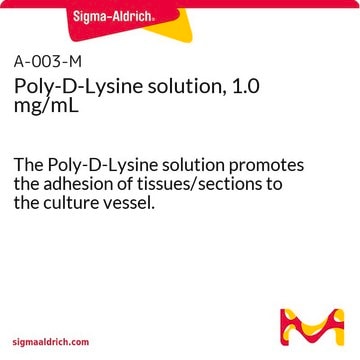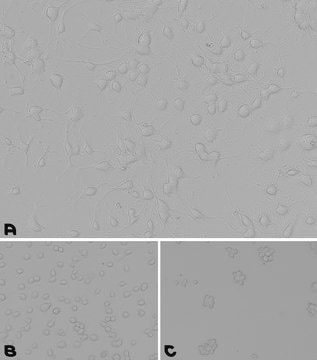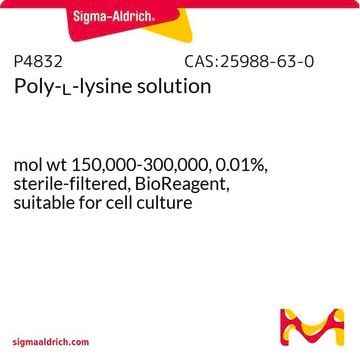LPDL001
Laminin/Poly-D-lysine Coating Solution
0.2 μm filtered, BioReagent, suitable for cell culture, Ready-to-use mixture
Sinónimos:
Attachment Factors, Coating mix, Laminin, PDL, Poly-D-lysine
About This Item
Productos recomendados
Quality Level
sterility
0.2 μm filtered
product line
BioReagent
form
liquid
technique(s)
cell culture | mammalian: suitable
shipped in
wet ice
storage temp.
2-8°C
General description
Application
- Attachment and spreading of a variety of cell types
- Enhancement of neuronal cell attachment to plastic and glass
- Support of neurite outgrowth
- Suitable for use with serum-free or reduced -serum cultures
Biochem/physiol Actions
Components
Poly-D-lysine hydrobromide molecular weight is 70,000-150,000 Da, a positively charged amino acid polymer.
Preparation Note
Storage Class
12 - Non Combustible Liquids
wgk_germany
WGK 1
Certificados de análisis (COA)
Busque Certificados de análisis (COA) introduciendo el número de lote del producto. Los números de lote se encuentran en la etiqueta del producto después de las palabras «Lot» o «Batch»
¿Ya tiene este producto?
Encuentre la documentación para los productos que ha comprado recientemente en la Biblioteca de documentos.
Contenido relacionado
Discover cancer research resources with modeling and profiling tools for cell culture, genomics, biomarkers, and more to help maximize your cancer research.
Discover cancer research resources with modeling and profiling tools for cell culture, genomics, biomarkers, and more to help maximize your cancer research.
Discover cancer research resources with modeling and profiling tools for cell culture, genomics, biomarkers, and more to help maximize your cancer research.
Discover cancer research resources with modeling and profiling tools for cell culture, genomics, biomarkers, and more to help maximize your cancer research.
Nuestro equipo de científicos tiene experiencia en todas las áreas de investigación: Ciencias de la vida, Ciencia de los materiales, Síntesis química, Cromatografía, Analítica y muchas otras.
Póngase en contacto con el Servicio técnico






